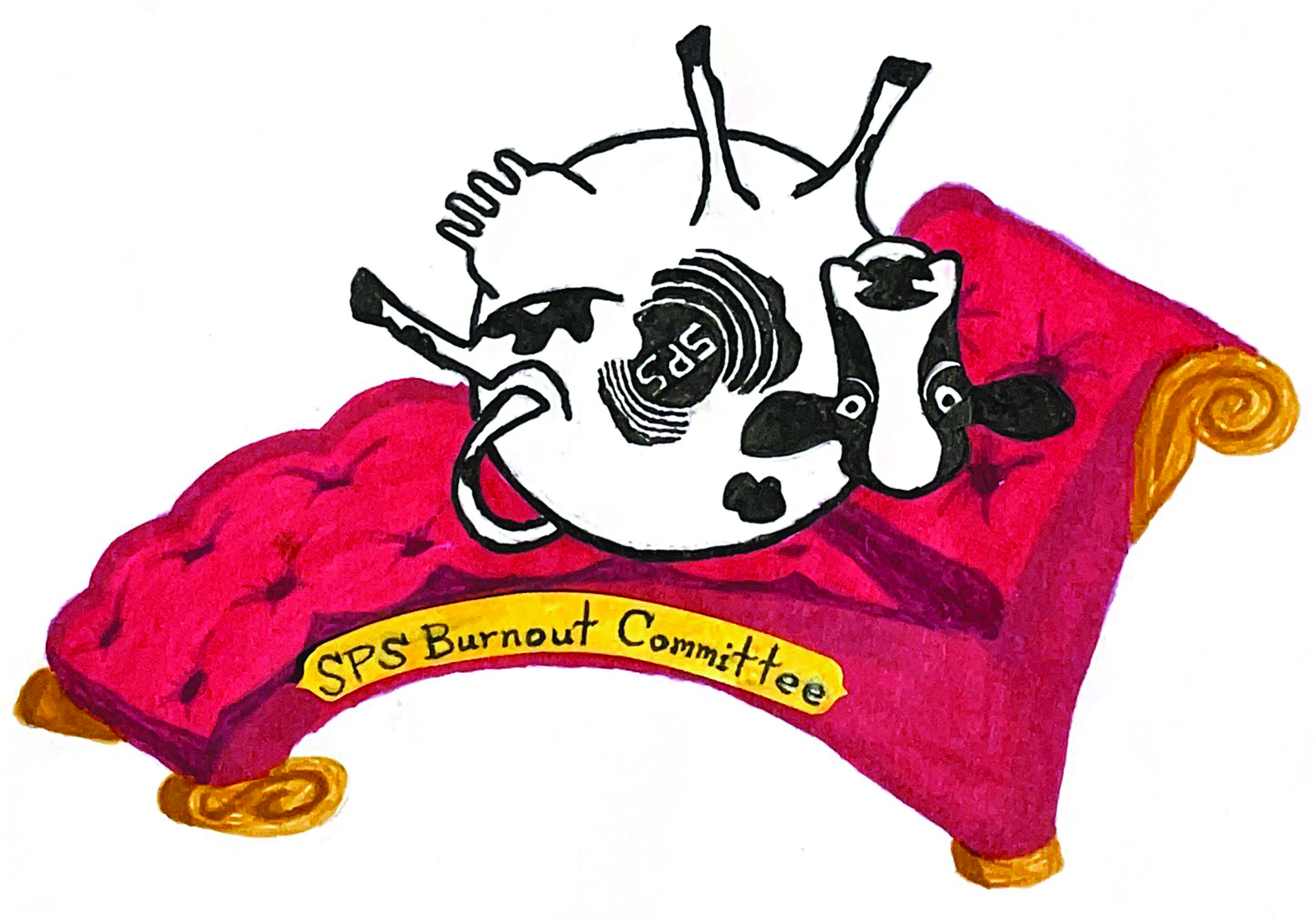Combating Burnout in Physics and Astronomy
Spring
2024
Feature
Combating Burnout in Physics and Astronomy
2023–24 SPS Council Burnout Committee Members Kiril A. Streletzky, SPS President, Stephanie Howell, Associate Zone Councilor for Zone 14, and Robert Laughlin, Associate Zone Councilor for Zone 6
Burnout isn’t a new concept for students. However, the COVID-19 pandemic that shut down many aspects of life in 2020 exacerbated the sense of burnout among physics and astronomy students. It dramatically affected their personal and academic lives and their postgraduation plans, and simultaneously shut down many of their support systems, including local SPS chapters and other clubs.
SPS and its governing body, the SPS Council, saw evidence of a devastating effect on SPS chapters. Work halted, applications for awards bottomed out, zone meetings were canceled, and fewer students (and faculty) could volunteer on the SPS Council. Chapter report submissions dropped 24% between 2019 and 2021. When SPS chapter leaders were asked why, the most common answer was burnout.
Because of these and other troubling signs, the 2020–21 SPS Council dug into the issue. At the Centennial Physics Congress, originally planned for 2021 but postponed until 2022, SPS leadership asked the more than 1,000 undergraduate attendees representing almost 260 colleges and universities to reflect on the challenges they face. Students selected, from a long and carefully composed list, the two most significant issues. The most frequently chosen were burnout (40.6%) and mental health (24%).1
As a committee tasked by the SPS Council with examining student burnout and proposing strategies to improve chapter health, we encourage all SPS members to take the following steps:
1. Complete the burnout survey and share it with your members
We designed a survey to gather data on (1) the extent of burnout, (2) the manifestation of burnout, and (3) the ways burnout affects people from groups historically marginalized in the physics and astronomy community. Informed by the data, we will be identifying ways to combat undergraduate burnout within our community. The survey will likely bring light to issues unique to the discipline and to students (and faculty) from marginalized groups. We plan to use this information to advocate for diversity, equity, and inclusion (DEI) initiatives, as many are under threat across the country. Please support this effort by scanning the QR code on the right and taking our survey, and by encouraging your chapter members to do so.
The SPS Council Burnout Committee that worked on the survey included: Thayne Dean, Noah Everett, Emma Hataway, S.H., Larry Isenhower, Aiden Keaveney, R. L., Rachel Nere, Zahin Ritee, K.S., and Matt Wright. Special thanks to Anne Marie Porter from AIP for her support in finalizing this survey.
2. Share helpful resources with your chapter
In 2021, the SPS Council compiled helpful resources and passed a statement on mental well-being in response to the persisting mental health crisis in the community. We encourage you to share these with your chapter members, post the resources in your chapter's gathering place, and make them easily accessible to everyone. In addition, please compile and share institution-specific mental health resources with your members. To read the statement and access the resources, please visit spsnational.org/about/governance/statements/mental-well-being.
3. Host activities that promote mental and physical health
One way to combat burnout is to follow seemingly simple advice for a healthy life, such as prioritizing your physical health. As the semester gets more stressful, many physics and astronomy students stay up late, stop exercising, work while they eat meals, and indulge in junk food. SPS chapters can combat this by holding park days, group hikes, soccer games, and potlucks that encourage physical health and reduce stress. Chapters can also host events to share healthy study habits, help members set reasonable expectations, and reinforce that setting boundaries and resting is essential, even as work piles up.
4. Celebrate Successes
Some students get discouraged by a lack of meaningful positive feedback on their work and a grind that can feel never ending. A good way to combat this is to celebrate chapter members for their accomplishments—finishing exams, finishing grad school applications, receiving awards or acceptances, presenting research, or making it through a particularly tough week. Consider creative ways to highlight individual members on your chapter’s social media, in the department newsletter, at chapter meetings or events, or in other formats.
“The first time I took a more advanced physics class I was not prepared at all. I did not know enough basics to succeed. Not knowing this, I tried anyway. I worked seven days a week only on that one class. Quickly, I got so burnt out that the thought of starting the next day would make me cry and my brain would just stop processing information. I would keep trying to get things done but my brain would not allow me to work. Had I known this was not normal, I would have reached out for help sooner.” – Sophia Amidi
SPS chapters cannot eliminate burnout, but they can help members reduce and manage burnout in healthy ways. We encourage chapter leaders to work together and find creative ways to cultivate welcoming environments that encourage student growth, reduce stress, and support each other during the daily grind and in times of crisis. Through SPS communities we can improve the experience of each student and help one another develop tools and support systems to keep burnout at bay.
References
- Brad R. Conrad and Matthew J. Wright, “Helping the Pandemic Generation,” Phys. Today 76 (9) (2023): 24–31, doi.org/10.1063/PT.3.5307.
Get Help
If you or someone you know is in a mental health crisis, please seek help. The following resources are free and available 24/7 from the comfort of your home. Call 911 in an emergency.
- Wikimedia Foundation maintains a list of mental health resources and crisis lines by country at meta.wikimedia.org/wiki/Mental_health_resources.
- Crisis Text Line: Text “HOME” to 741741 anytime for free crisis counseling.
- Grad Resources, National Grad Crisis Line: Call (877) GRAD-HLP, and find resources for free counseling and more on the website gradresources.org.
- Support on social media: The 988 Suicide and Crisis Lifeline will help you contact social media platforms directly if you’re concerned about a friend’s social media postings: 988lifeline.org/help-someone-else.
- 988 Suicide and Crisis Lifeline: Call or text 988 from anywhere within the United States for free and confidential help with a mental health crisis.
- Thrive Lifeline: Text (313) 662-8209 to access support from qualified crisis responders in STEMM (science, technology, engineering, mathematics, and medicine). Learn more at thrivelifeline.org.
- Veterans Crisis Line: Call (800) 273-TALK (8255) and press 1, or text to 838255 for a free, confidential resource that connects veterans with trained responders, 24 hours a day, seven days a week.
- Tip: Save a picture of these resources on your phone so they’re always within easy reach.


